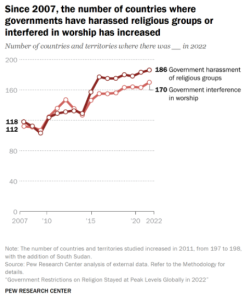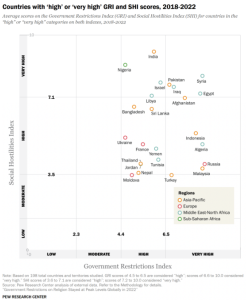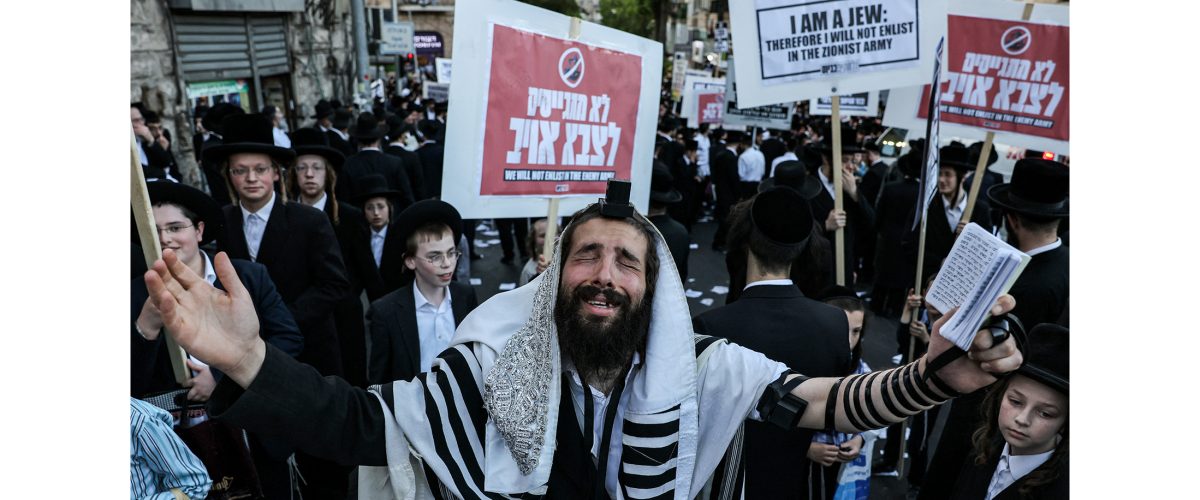Nations with governments highly repressive of certain religious groups usually have societies equally antagonistic toward religious minorities, new research shows.
“Government restrictions and social hostilities tend to go hand in hand,” Pew Research Center says in its latest report on religion-related government and social oppression.
The study measured levels of governmental and nongovernmental intimidation of communities based on religious belief from 2018 to 2022. Researchers set out to determine if countries with government restrictions on faith groups had corresponding levels of social repression.
 “For the most part, the answer is yes,” Pew reports in the study released Dec. 18. “Over the five-year period, roughly three-quarters of all countries had either ‘high’ or ‘very high’ levels of both kinds of restrictions, or they had ‘low’ or ‘moderate’ levels of both kinds of restrictions.”
“For the most part, the answer is yes,” Pew reports in the study released Dec. 18. “Over the five-year period, roughly three-quarters of all countries had either ‘high’ or ‘very high’ levels of both kinds of restrictions, or they had ‘low’ or ‘moderate’ levels of both kinds of restrictions.”
Afghanistan, Egypt, India, Iraq, Israel, Nigeria and Pakistan are among the 24 nations scoring high in both governmental and social religious hostility, with many of them experiencing religion-based military conflicts, sectarian strife and other forms of violence. “Also in this category are a handful of countries in South Asia that, for many years, have had religion-related violence by nongovernmental actors while also having high or very high government restrictions,” the report says.
Pew found 12% of nations with high or very high scores in both categories, including nine countries in the Middle East-North Africa region, 10 in the Asia-Pacific region and four in Europe. “Just one of the 48 countries in sub-Saharan Africa fell in these categories during that time span, and none of the 35 countries in the Americas did.”
Of the 198 nations included in the study, 32 measure high or very high in government restrictions of religious groups but low or moderate in of nongovernmental hostility.
“The pattern found in the present study is that countries displaying a combination of high or very high levels of government restrictions and low or moderate levels of social hostilities tend to have authoritarian governments, give preferential treatment to one or more religions, or have a general hostile relationship toward religious institutions. Such regimes may tightly control religion as part of broader restrictions on civil liberties,” Pew explains.
Azerbaijan, Kazakhstan, Kyrgyzstan, Tajikistan, Turkmenistan and Uzbekistan are among the former-Soviet Union countries in this category.
 “China, Cuba and Vietnam also are authoritarian regimes that have high or very high (government restriction) scores but are in the low or moderate range of social hostilities. All three governments also are generally hostile toward religious institutions,” the report explains.
“China, Cuba and Vietnam also are authoritarian regimes that have high or very high (government restriction) scores but are in the low or moderate range of social hostilities. All three governments also are generally hostile toward religious institutions,” the report explains.
Of all the nations analyzed, only 19 measure high or very high in religion-related social discrimination with low or moderate levels of government oppression.
These include three democracies — Denmark, Germany and the United Kingdom — and three so-called “flawed democracies,” Belgium, Brazil and the Philippines. Another eight in this group are listed as authoritarian.
But 123 of the 198 countries studied have low or moderate levels of both governmental and nongovernmental repression of religion, including the U.S., Canada and 30 other countries in the Americas, 33 nations in Europe, 34 in sub-Saharan Africa and 24 in the Asia-Pacific region. No Middle Eastern or North African countries measured low or moderate on both indexes.
Verbal and physical pressure against faith communities were among the more prevalent forms of government harassment of religious groups in 2022, the report says. These were reported in 94% of the countries studied.
“Government interference in worship also remained common around the world in 2022,” Pew notes. “It was reported by the sources used in this study in 170 countries and territories (86%).”
The latest study marks the 15th time Pew has measured international constraints on religion and includes conditions affecting more than 99.5% of the world’s population.


